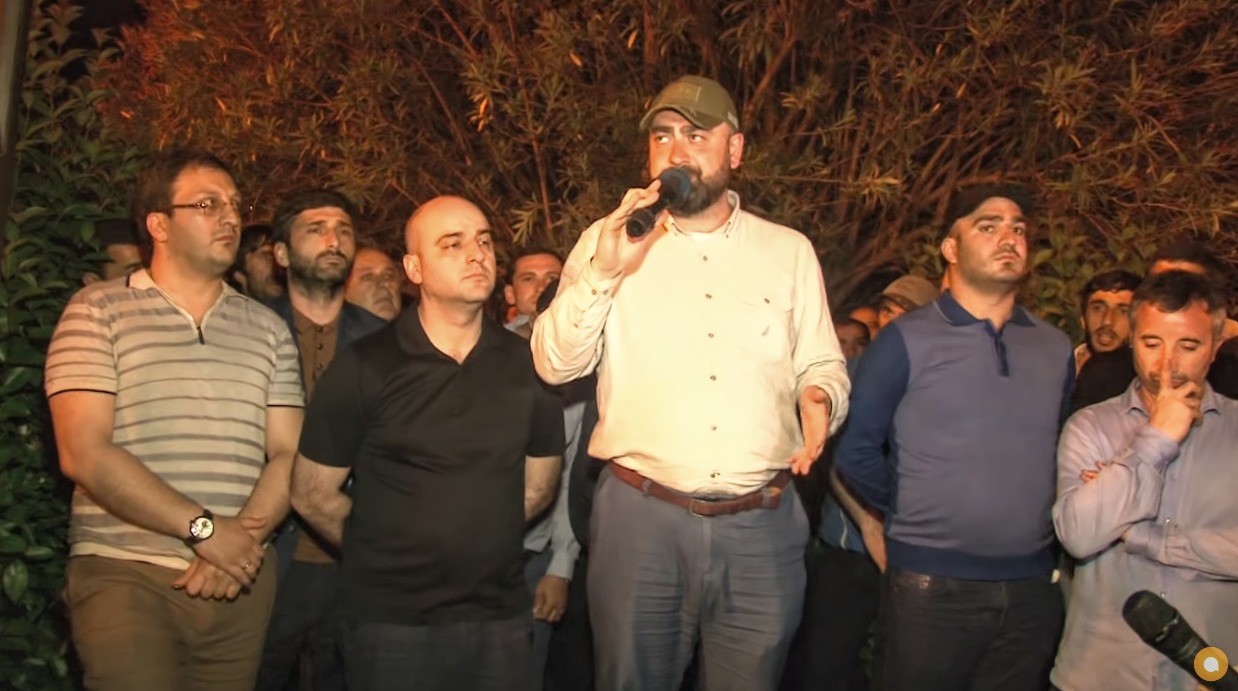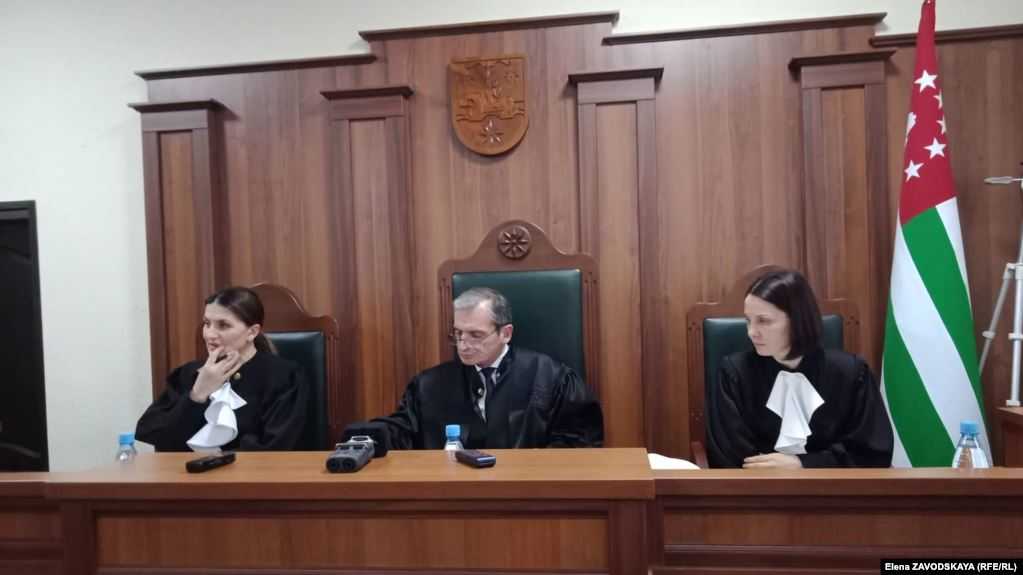

Abkhazian President Raul Khadzhimba has urged parliament to approve a constitutional amendment that would allow this year’s presidential election to be postponed, a key demand of opposition protesters.
On Thursday, Khadzhimba appealed to lawmakers to support a draft constitutional amendment reducing the deadline for holding presidential elections from two months before the expiration of the sitting president’s term to just one month.
This would allow the vote, scheduled for 21 July, to be postponed until August. Khadzimba’s five-year term as president ends on 25 September.
According to the opposition, the changes would also free candidates from having to undertake an Abkhaz language test, which is compulsory for presidential contenders.
The president sat down with opposition leaders on Tuesday following two days of protests in the Abkhazian capital Sukhumi (Sukhum).
The date of the election was first announced on 4 April, however, political tensions grew in mid-April after the candidate of opposition group the National Movement for the Protection of Statehood (OND), Aslan Bzhania, fell suddenly ill. The opposition suggested that Bzhania, who has reportedly been recovering in a hospital in Moscow, could have been poisoned.
Several hundred opposition supporters gathered in front of the Abkhazian parliament, the People’s Assembly, on Monday demanding the elections be delayed until November and that President Khadzhimba resign.
Later that day, MPs held a hearing on the opposition’s initiative but ultimately voted against it 19-14.
Following this, the OND called for ‘civil disobedience’, leading to the motorway linking Sukhumi with the east of Abkhazia being blocked and most of the capital’s public transport being paralysed for around 16 hours.
Throughout Tuesday, there was a heavy police presence outside the parliament building.
On Tuesday evening, Russian state-run news site Sputnik Abkhazia published a report on the possible damage the protests had caused to the summer tourist season in Abkhazia. They also reported that an event dedicated to the victims of the Russian conquest of the Caucasus, traditionally marked on 21 May, had to be postponed.
Late on Tuesday evening, Khadzhimba reached out to protesters by sending Defence Minister Mirab Kishmaria to meet with protest leaders Teimuraz Khishba, the prospective OND campaign manager, MP Dmitri Dbar, and former foreign minister Sergei Shamba.
Possible mercury and aluminium poisoning
On Tuesday, Parliamentary Speaker Valeriy Kvarchiya said that the doctors treating Bzhania in Moscow had officially ‘ruled out poisoning’.
According to General Prosecutor Zurab Achba, the medical conclusion received from Moscow said that Bzhania suffered from ‘acute polyneuropathy’, a condition affecting the peripheral nerves resulting from illness or injury.
Achba also said that an Abkhazian team of investigators dispatched to Moscow would question Bzhania’s bodyguards, who had reportedly become ill soon after Bzhania’s health deteriorated.
At a press conference on 17 May, the OND reported on the results of ‘independent’ medical tests, which they said were conducted by a clinic in Munich, Germany, that ‘confirmed a version of outside interference with the aim to physically eliminate the leader of the opposition’.
According to the OND, the test results, handed over by ‘family members’ of Bzhania, indicated ‘high levels’ of cadmium, benzodiazepines, and mercury in his blood, as well as a high level of aluminium in his urine.
They said doctors had speculated that the presence of benzodiazepines in Bzhania’s blood could be traces of sedatives, while cadmium could be a result of two blood cleaning procedures. According to the opposition, doctors in Germany identified mercury and aluminium as the main suspects of poisoning.
During the press conference, the opposition demanded the election be postponed until 23 November.
Bzhania’s camp first officially announced that he may have been poisoned during a press conference on 2 May. This contradicted the claim of the Association of Doctors of Abkhazia in Moscow on 20 April that ‘as a result of comprehensive tests’, Bzhaniya was diagnosed with bacterial pneumonia.
According to the OND, Bzhania experienced ‘intense distress’ and slurred speech on 17 April, leading his family to suspect he was having a stroke. The following day, Bzhania was unable to speak and was only able to communicate in written form.
He was later taken to Sochi, in Russia, where he underwent a CT scan and a complete blood workup, among ‘other tests’. He was then transported by plane on 19 April to the Buyanov Moscow City Clinical Hospital for further testing.
Who is Aslan Bzhaniya?
The opposition OND coalition Bzhaniya is running for was formed in August 2018 and includes the United Abkhazia party, the Amtsakhara Party, and civil society groups Abzankhara and Apsadgyl.
In the 2014 presidential election, Bzhaniya, a former head of Abkhazia’s State Security Service (SGB), came second after Khadzhimba, receiving 36% of the vote.
As a former ally of third president Aleksandr Ankvab, who resigned in May 2014 following opposition protests, he later said running for president was a mistake, suggesting it legitimised the elections that followed Ankvab’s resignation.
In 2015, he founded Apra, a foundation ‘studying social-economic and political issues’ in Abkhazia. Two years later, he was elected to the Abkhazian parliament, the National Assembly, and has since been widely considered one of the main challengers to Khadzhimba.
In December 2016, while entering Abkhazia from Russia through the River Psou checkpoint, Aslan Bzhaniya was detained and questioned in Sochi by Russian authorities on suspicion of illegally possessing ammunition. Released after two days, Bzhaniya and his supporting Amtsakhara opposition party accused president Khadzhimba of being behind the arrest.
In a 4 March interview with Abkhazia Inform, Bzhaniya described the current Abkhazian government as ‘unprofessional’, ‘incompetent’, and riddled by a ‘high level of corruption’.
According to the Abkhazian Election Commission, political parties and initiative groups will be able to register their candidates from 22 May.
Others that have already voiced their intention to run for president include Almas Dzhapua, a prominent critic of Abkhazia’s oil industry. Dzhapua, unlike Bzhaniya, has also opposed lifting a moratorium on the sale of real estate to foreigners, primarily, Russians.
In April 2016, a car of Dzhapua, then an MP, was blown up in Sukhumi, but he was not hurt. His allies claimed it was connected to his position on the real estate ban.
Astamur Tarba, also a former head of the Abkhazian SGB who had been absent from public life until recently has also announced he will run.
For ease of reading, we choose not to use qualifiers such as ‘de facto’, ‘unrecognised’, or ‘partially recognised’ when discussing institutions or political positions within Abkhazia, Nagorno-Karabakh, and South Ossetia. This does not imply a position on their status.









